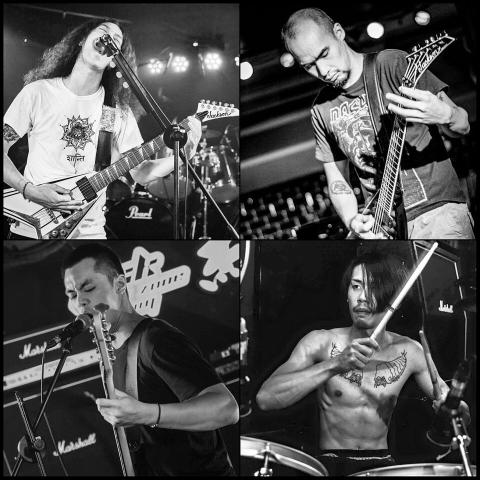They say you should write with your audience in mind. I’ve never fully understood that. If anything, the audience should be treated with a healthy dose of contempt. All things should. Government. Vapid celebrities. Anti-vaxxers. The entire grim morass deserving of little more than naked antipathy and unveiled skepticism.
Italian painter and sculptor Alberto Burri wasn’t thinking of the critics wet lips puckered against his backside when he was singeing petroleum byproducts and melting PVC in the name of eccentric abstraction. Nor should metal bands be dreaming of being critical darlings when they seek to achieve the equivalent with their music.
Grindcore has always been the aural equivalent of Burri. Something that was never meant to be understood, but nevertheless can lead those who are willing to go through its wonderful cacophonous suffering to a higher level of understanding of this confounding world.

Photo courtesy of chang lang, brutal wei and rex ho
For nigh on a decade Taipei four piece grind act Ashen has been blasting away at the conventions of modern metal by adhering to the original grindcore aesthetics birthed by the likes of early Swans and Repulsion. A sound so grating, antisocial and full of contempt it almost sought rejection in the way the predecessor punk rock did during the brief window prior to its inevitable commercialization.
It hasn’t been easy for Ashen, flying the grind flag all but solo since 2007 (save for compatriots in filth Brain Corrosion) in a scene that trends far to the commercial end of the spectrum. Politically conscious from the outset, the band melded hardcore punk’s uncompromising lyrical aggression with a focused and blasting intensity into a sound always a dropped beat away from running off the tracks.
Through numerous lineup changes and subsequent prolonged absences guitarist, vocalist and main songwriter Bruce Chen (陳威豪) managed to keep bringing Ashen back just when people thought they might have gone away. And every time they came back, the razor’s edge was always a few microns sharper, the sound just that much more intense, the lyrics noticeably more pissed off.
A split with Usepentosing (用筆來唱歌), an EP (H1N1) and a single comprised the band’s catalog up to 2012, the elusive full-length left out of reach by lineup instabilities wrought by the usual pitfalls suffered by bands in Taiwan (military service, familial pressure/filial piety guilt trips about taking an iron bowl job and joining the suit and tie army).
Finally, in May of last year, the long-awaited full-length debut saw the light of day. The World Is Not Ours, 19 tracks of blistering grind inferno stoked by righteous sociopolitical rage and the frustrations of a decade spent clawing against that crippling societal expectations of what makes a person worthy in the eyes of the moral gatekeepers. Those who keep the bulk of the population (here and everywhere) safely ensconced in the warm cocoon of the milquetoast middle.
Now with a stable drummer in place for the first time in years, Ashen is poised to lead a new generation of abstract expressionists (grindcore/death metal/ black metal bands) away from the commercial tendencies of the predominant (and largely redundant) sects of deathcore and metalcore.
Tomorrow night four such acts will come together on a single bill, leaders and new jacks in a sub-sect of the scene running as far and fast as they can from the popularity contest the Taiwan underground seems perpetually in danger of becoming.
Necroabbot (previously Bitch Finder) plays a brand of blackened D-beat metal punk so filthy it could have crawled up out of the cooling towers of the Lungmen nuclear power plant. Band leader, guitarist Spike Yang (楊凱勝), is without doubt one of the most potent and volatile riff lords of the scene, and has been through a multitude of projects running the entire extreme gauntlet for well over a decade.
There was a time when black metal had a strong foothold in Taiwan (relatively speaking). Bands like South of Heaven, Inferno Requiem, Hades, and Blair Witch (the former two Yang also played with) did what Ashen has done for grind in the country, carrying a small movement of a dedicated few.
All of those bands gradually fell by the wayside, with only Inferno Requiem left standing, but now Armed Judas has picked up the raw black metal torch and held it high early on in their career. The band is coming off an impressive opening slot for Polish blackened death titans Behemoth, and seems to be on the verge of leading the charge for a new brand of Taiwanese extremity wholly unconcerned with broad appeal or critical plaudits.
Rounding out the bill is newcomer death-thrash band Iron Fist (鐵拳). With just a handful of live shows under their bullet belts since making their debut last September, the band is already playing with a level of confidence and poise beyond their years.
The common denominator — none of these bands plays, writes or composes with the audience in mind. They do so with the lifeblood of Burri and Justin Broadrick flowing through their veins. They seek the dirge. The inexplicable. The deliberately misunderstood. They are Taiwan’s new abstract expressionists — the one true threat.
■ Ashen, Necroabbot, Armed Judas and Iron Fist play tomorrow at Revolver, 1-2 Roosevelt Road, Sec 1, Taipei City (台北市中正區羅斯福路一段1-2號). Tickets are NT$300 at the door and include a drink. Doors open at 7:30pm and bands take the stage at 8pm.

During the Metal Ages, prior to the arrival of the Dutch and Chinese, a great shift took place in indigenous material culture. Glass and agate beads, introduced after 400BC, completely replaced Taiwanese nephrite (jade) as the ornamental materials of choice, anthropologist Liu Jiun-Yu (劉俊昱) of the University of Washington wrote in a 2023 article. He added of the island’s modern indigenous peoples: “They are the descendants of prehistoric Formosans but have no nephrite-using cultures.” Moderns squint at that dynamic era of trade and cultural change through the mutually supporting lenses of later settler-colonialism and imperial power, which treated the indigenous as

By 1971, heroin and opium use among US troops fighting in Vietnam had reached epidemic proportions, with 42 percent of American servicemen saying they’d tried opioids at least once and around 20 percent claiming some level of addiction, according to the US Department of Defense. Though heroin use by US troops has been little discussed in the context of Taiwan, these and other drugs — produced in part by rogue Chinese Nationalist Party (KMT) armies then in Thailand and Myanmar — also spread to US military bases on the island, where soldiers were often stoned or high. American military policeman

The Venice Film Festival kicked off with the world premiere of Paolo Sorrentino’s La Grazia Wednesday night on the Lido. The opening ceremony of the festival also saw Francis Ford Coppola presenting filmmaker Werner Herzog with a lifetime achievement prize. The 82nd edition of the glamorous international film festival is playing host to many Hollywood stars, including George Clooney, Julia Roberts and Dwayne Johnson, and famed auteurs, from Guillermo del Toro to Kathryn Bigelow, who all have films debuting over the next 10 days. The conflict in Gaza has also already been an everpresent topic both outside the festival’s walls, where

An attempt to promote friendship between Japan and countries in Africa has transformed into a xenophobic row about migration after inaccurate media reports suggested the scheme would lead to a “flood of immigrants.” The controversy erupted after the Japan International Cooperation Agency, or JICA, said this month it had designated four Japanese cities as “Africa hometowns” for partner countries in Africa: Mozambique, Nigeria, Ghana and Tanzania. The program, announced at the end of an international conference on African development in Yokohama, will involve personnel exchanges and events to foster closer ties between the four regional Japanese cities — Imabari, Kisarazu, Sanjo and